|
|
|
Sort Order |
|
|
|
Items / Page
|
|
|
|
|
|
|
| Srl | Item |
| 1 |
ID:
188254
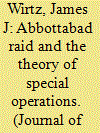

|
|
|
|
|
| Summary/Abstract |
When ‘The Theory of Special Operations’ was written in 1993 by then Commander William H. McRaven, USN, Al Qaeda was barely on the strategic horizon. Nevertheless, this thesis helped shape the denouement of the horrible tragedy that befell the world on 11 September 2001. This article describes McRaven’s work and traces its influence on the 2011 Abbottabad Raid. It also identifies how the theory might be modified to better capture the civil-military nexus at the apex of the strategic use of special operations forces.
|
|
|
|
|
|
|
|
|
|
|
|
|
|
|
|
| 2 |
ID:
070581
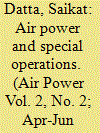

|
|
|
| 3 |
ID:
178299
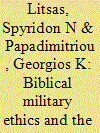

|
|
|
|
|
| Summary/Abstract |
The deployment of special forces in hostile or politically volatile environments in search of strategic/operational intelligence, though not a 21st century novelty, appeared as a distinct military activity in literature only in the early 2000s under the label ‘Special Reconnaissance’ (SR). This article argues that the concept of SR (a) originated in the biblical Israelite military tradition and is depicted in the Bible as the lapis angularis of military strategy and a practice capable of dictating military and political norms; (b) has been used as a key element of the Israel Defence Forces’ (IDF) modus operandi since 1948 thenceforth functioning in an analogous manner. To support these arguments, the theoretical and practical characteristics of Moses’ intelligence mission to Canaan as well as the IDF’s proclivity to SR are scrutinised under the general theoretical framework of political realism that assumes rational and pro-state interest course of actions. Accordingly, SR emerges as a distinctive common instrument of biblical and contemporary Israeli strategy, a fact that underlines the uninterrupted socio-political and cultural links between the past and the present of the Israeli ontology, this time via the wider concept of the Israeli military ethics.
|
|
|
|
|
|
|
|
|
|
|
|
|
|
|
|
| 4 |
ID:
039186
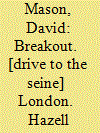

|
|
|
|
|
| Publication |
London, Hazell Watson and Viney Ltd, 1968.
|
| Description |
160p.Pbk
|
| Series |
Purrells' History of the Second World War Campaign Book
|
|
|
|
|
|
|
|
|
|
|
|
Copies: C:1/I:0,R:0,Q:0
Circulation
| Accession# | Call# | Current Location | Status | Policy | Location |
| 004727 | 940.542144/MAS 004727 | Main | On Shelf | General | |
|
|
|
|
| 5 |
ID:
025865
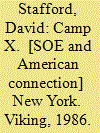

|
|
|
|
|
| Publication |
New York, Viking, 1986.
|
| Description |
xxiv, 327p.Hbk
|
| Standard Number |
0670817376
|
|
|
|
|
|
|
|
|
|
|
|
Copies: C:1/I:0,R:0,Q:0
Circulation
| Accession# | Call# | Current Location | Status | Policy | Location |
| 028868 | 940.548641/STA 028868 | Main | On Shelf | General | |
|
|
|
|
| 6 |
ID:
182015
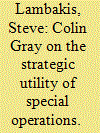

|
|
|
|
|
| Summary/Abstract |
The challenges Colin Gray faced to publish a fully fleshed out analysis of the contribution made by special operations to defense and security were many. James Kiras runs through his different efforts across the year in a nearby tribute. Colin believed that the best way to understand the strategic utility of special operations was to look at it through the lens of history, and, as one who worked closely with him on his project, I would like to lay out what I believe were his most significant insights on this subject and look at what might be called his pioneering, and sadly unpublished, work on the subject: Special Operations: What Succeeds and Why.
|
|
|
|
|
|
|
|
|
|
|
|
|
|
|
|
| 7 |
ID:
117559
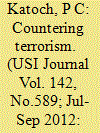

|
|
|
| 8 |
ID:
186543
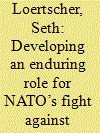

|
|
|
|
|
| Summary/Abstract |
As NATO drafts its next Strategic Concept, it faces a persistent and more diverse threat from terrorism than when the 2010 Strategic Concept was written. In addition, the Alliance faces greater threats from geopolitical competition, leading to its member states shifting resources away from the fight against terrorism. In drafting of the next Strategic Concept, NATO must continue to prioritize the development of an enduring and sustainable approach to maintain its focus on terrorist threats. This essay argues that a sustainable and enduring approach to fighting terrorism requires NATO to adopt three key tasks (1) improving the Alliance’s defensive capabilities, (2) maintaining its ability to respond to crises and (3) focusing on intelligence sharing. In order to ensure this approach is sustainable for the Alliance, NATO must implement these key tasks by focusing on and integrating terrorism within NATO policy and increasing collaboration with allies and multinational partners.
|
|
|
|
|
|
|
|
|
|
|
|
|
|
|
|
| 9 |
ID:
125375
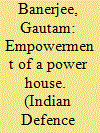

|
|
|
|
|
| Publication |
2013.
|
| Summary/Abstract |
By age-old convention, most wars have various forms of tactical operations undertaken under one overall plan - set-piece, irregular and Special Operations, for example. Indeed, the so called 'conventional war' has always had unconventional tactical recourses built into it. The infantry battalion has been in lead role in such irregular or unconventional operations, its flexibility of structure, weaponry and training allowing it to be moved by any mode of transport and fielded in any of the kind of aforesaid operations - all with equal proficiency and without much ado. The final test may, therefore, be to evaluate the significant flexibility which the infantry battalion has traditionally possessed.
"Do not wait to strike until the iron is hot but make it hot by striking." -William Sprague
|
|
|
|
|
|
|
|
|
|
|
|
|
|
|
|
| 10 |
ID:
153051
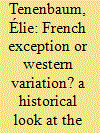

|
|
|
|
|
| Summary/Abstract |
This article aims at challenging the notion of a French exception in the realm of irregular warfare, suggesting that it rather amounts to a western variation. Born out of a transatlantic community under British influence, the French irregular experience carried on through the early Cold War challenges, strengthening France’s ties with its Western allies. France’s subsequent involvement in post-colonial counter-insurgencies did contribute to generating some specific strategic features, although never totally disconnected from international circulation. Finally, the post-Cold War order significantly drove French irregular warfare back into its Western fold through the adoption of US- and NATO-sponsored concepts and doctrines, thus enhancing interoperability and some degree of standardisation.
|
|
|
|
|
|
|
|
|
|
|
|
|
|
|
|
| 11 |
ID:
089834
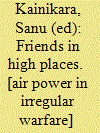

|
|
|
|
|
| Publication |
Australia, Air Power Development Centre, 2009.
|
| Description |
xx, 248p.
|
| Standard Number |
9781920800468
|
|
|
|
|
|
|
|
|
|
|
|
Copies: C:1/I:0,R:0,Q:0
Circulation
| Accession# | Call# | Current Location | Status | Policy | Location |
| 054338 | 355.0218/KAI 054338 | Main | On Shelf | General | |
|
|
|
|
| 12 |
ID:
156271
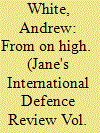

|
|
|
| 13 |
ID:
116121
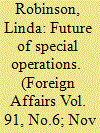

|
|
|
|
|
| Publication |
2012.
|
| Summary/Abstract |
Over the past decade, the United States' military and the country's national security strategy have come to rely on special operations to an unprecedented degree. As identifying and neutralizing terrorists and insurgents has become one of the Pentagon's most crucial tasks, special operations forces have honed their ability to conduct manhunts, adopting a new targeting system known as "find, fix, finish, exploit, analyze, and disseminate." They have adopted a flatter organizational structure and collaborated more closely with intelligence agencies, allowing special operations to move at "the speed of war," in the words of the retired army general Stanley McChrystal, the chief architect of the contemporary U.S. approach to counterterrorism.
|
|
|
|
|
|
|
|
|
|
|
|
|
|
|
|
| 14 |
ID:
128798
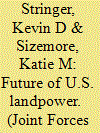

|
|
|
| 15 |
ID:
119314
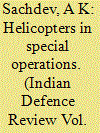

|
|
|
| 16 |
ID:
137462
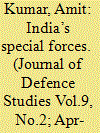

|
|
|
|
|
| Summary/Abstract |
At a time when the battlefield has been progressively transforming from the conventional to unconventional, the role of Special Forces will become critical in shaping its outcome. Conflicts in the past decade have established the primacy of such forces. Their role has evolved and today special operations are meant to be decisive and achieve strategic objectives. The Indian security establishment has also been taking notice of these changes and by and large making right moves. As India embarks on the path of high economic growth and becomes a power to reckon with, its troubled neighborhood poses the biggest challenge to it. The role of Special Forces will thus be critical in outwitting adversaries’ moves in the neighborhood and areas of India’s strategic interests, and in promoting India’s security.
|
|
|
|
|
|
|
|
|
|
|
|
|
|
|
|
| 17 |
ID:
080867
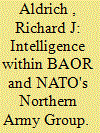

|
|
|
|
|
| Publication |
2008.
|
| Summary/Abstract |
During the Cold War the UK's principal military role was its commitment to the North Atlantic Treaty Organisation (NATO) through the British Army of the Rhine (BAOR), together with wartime command of NATO's Northern Army Group. The possibility of a surprise attack by the numerically superior Warsaw Pact forces ensured that great importance was attached to intelligence, warning and rapid mobilisation. As yet we know very little about the intelligence dimension of BAOR and its interface with NATO allies. This article attempts to address these neglected issues, ending with the impact of the 1973 Yom Kippur War upon NATO thinking about warning and surprise in the mid-1970s. It concludes that the arrangements made by Whitehall for support to BAOR from national assets during crisis or transition to war were - at best - improbable. Accordingly, over the years, BAOR developed its own unique assets in the realm of both intelligence collection and special operations in order to prepare for the possible outbreak of co
|
|
|
|
|
|
|
|
|
|
|
|
|
|
|
|
| 18 |
ID:
133510
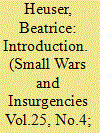

|
|
|
|
|
| Publication |
2014.
|
| Summary/Abstract |
When twentieth-century authors wrote about 'partisan warfare', they usually meant an insurgency or asymmetric military operations conducted against a superior force by small bands of ideologically driven irregular fighters. By contrast, originally (i.e. before the French Revolution) 'partisan' in French, English, and German referred only to the leader of a detachment of special forces (party, partie, Parthey, détachement) which the major European powers used to conduct special operations alongside their regular forces. Such special operations were the classic definition of 'small war' (petite guerre) in the late seventeenth and in the eighteenth centuries. The Spanish word 'la guerrilla', meaning nothing other than 'small war', only acquired an association with rebellion with the Spanish War of Independence against Napoleon. Even after this, however, armies throughout the world have continued to employ special forces. In the late nineteenth century, their operations have still been referred to as prosecuting 'la guerrilla' or 'small war', which existed side by side with, and was often mixed with, 'people's war' or popular uprisings against hated regimes.
|
|
|
|
|
|
|
|
|
|
|
|
|
|
|
|
| 19 |
ID:
126145
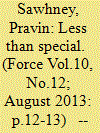

|
|
|
|
|
| Publication |
2013.
|
| Summary/Abstract |
Special Forces (SF) in India have an existential dilemma. On the one hand the absolute defensive approach of the government to national security makes SF unnecessary. On the other hand senior military commanders rarely understand that special operations are qualitatively different from regular warfare, not a sub-category of it. Talks, therefore, of raising SF command is putting the cart before the horse. The need is to first resolve the fundamental issues at the political and military levels.
|
|
|
|
|
|
|
|
|
|
|
|
|
|
|
|
| 20 |
ID:
133518
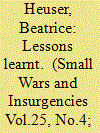

|
|
|
|
|
| Publication |
2014.
|
| Summary/Abstract |
Did participants in small wars in the period 1775-1831 learn from previous or contemporary examples? While this is difficult to prove for participants who left no written records, there is considerable evidence in existing publications by practitioners that they did indeed draw out lessons from recent insurgencies, either from their own experience or from events elsewhere which they studied from afar, especially the Spanish Guerrilla, which had already become legendary. Most authors showed an interest in how to stage insurgencies rather than in how to quell them. Even then, transfer did not come in a package of tactics-cum-values, but in each case in different configurations.
|
|
|
|
|
|
|
|
|
|
|
|
|
|
|
|
|
|
|
|
|